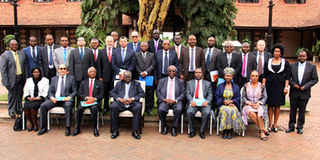Reminiscing a memorable tenure as Unesco Africa water envoy

Special UNESCO Special Envoy for Water in Africa Mwai Kibaki (seated, fourth from left) in a group photograph after meeting with African Ambassadors and High Commissioners accredited to Kenya at Windsor Golf Hotel, Nairobi on August 11, 2016. PHOTO | COURTESY
What you need to know:
More than two billion people suffer “high water stress” while about four billion experience “… severe water scarcity during at least one month of the year.”
And the situation could worsen. This year’s report predicts that climate change will progressively imperil the global community insofar as the worldwide water outlook is concerned.
It also warns that climate change will affect availability, quality and quantity of water and threaten previously hoped-for gains in the water and sanitation sector for billions.
I am grateful for the privilege to have served as Unesco special envoy for water in Africa for two terms of two years each that ended last month.
The role focused on raising awareness on the importance of water and education in national policies, conveying Unesco hydrological messages to political leaders and being an interlocutor between governments and Unesco.
A lot has come to pass in those four years. Thankfully, there have been inestimable lessons and insights on how water could affect human existence and endeavours in the foreseeable future. On this particular score, Africa is particularly encumbered.
Buoyed by a surging world population, marked up socioeconomic development and dynamic consumption patterns, water use since the 1980s has been growing at the rate of one per cent annually, according to the United Nation’s “Water Development Report 2019”. By 2050, the trajectory is expected to be 20-30 per cent of the current consumption rate because of escalating domestic and industrial demand.
The report says more than two billion people suffer “high water stress” while about four billion experience “… severe water scarcity during at least one month of the year.”
And the situation could worsen. This year’s report predicts that climate change will progressively imperil the global community insofar as the worldwide water outlook is concerned. It also warns that climate change will affect availability, quality and quantity of water and threaten previously hoped-for gains in the water and sanitation sector for billions.
Energy production, food security, human health, economic development and the fight against poverty are also under threat. This dreadful prospect spells gloom on achieving the UN’s Sustainable Development Goals (SDGs).
During my tenure, I met water ministers from across Africa, discoursed with ambassadors and high commissioners accredited to Kenya on continental water issues, and met UN envoys representing Pan-African water-bound initiatives. I also assigned delegations to key conferences. Besides, being the patron of the Millennium Water - Africa (MWA) for close to a decade has been a tremendous eye opener.
Beyond the information researchers have shared, a number of the water-related events under the special envoy’s docket have ultimately borne worthwhile insights into the future of water in the development of Africa.
The challenge of rethinking water in an existential context has been compounded by the prevailing worldwide onslaught on the Covid-19 pandemic. At no time in my recollection has the role of water in averting a potentially sweeping disaster been so markedly underlined.
Ironically, as Covid-19 continues to visit its sinister ravages on the human race, hundreds in Kenya have recently lost lives, homes and livelihoods to floods. While such are the confounding contradictions of life, it would be remiss of us not to thoughtfully seek lasting solutions to our water-related afflictions the earliest we can.
Water, ideally, is a blessing, not a curse. We should encourage people right across Africa to join the solution-seeking crusade. This is particularly crucial in these days of aggressive rising water levels in lakes and oceans.
Two initiatives may improve the continent’s efforts at overcoming water-related challenges. First, a central repository of water experts and a reservoir of shareable know-how. To ensure that Africa’s water-bound knowledge is regularly updated, it would help to presage, or better yet, mate Amcow’s (Africa’s Ministers’ Council on Water) biennial “Water Week” with an Africa water experts’ conference.
Secondly, an annual continental media award focused on sharing information on ingenious water conservation and aquifer recharging methods is due. This can help to identify replicable innovations and appropriate knowledge in securing our dwindling water towers and capture and amplify homemade solutions.
The power to transform our water challenges in Africa may seem daunting, but it is within sight, if we so purpose.
Mr Kibaki, the outgoing Unesco Envoy for Water in Africa, was the third President of Kenya.





